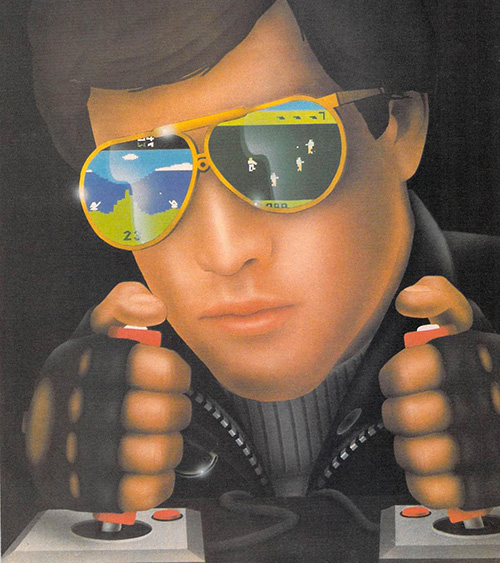Sometimes it’s hard to believe there was a time when the Adobe Creative Suite didn’t exist. Prior to the late 1980s, if you were creating an advertisement or illustration for a magazine, cover art for a video game cartridge, a movie poster or a book cover, you did it the way it’s been done since the dawn of the retail age: ink, paint, X-Acto knives and airbrushing. This article deals with the airbrush, in particular, airbrushed video game art.
The early 1980s were the glory days of the airbrush in commercial video game art. This is partly because many of the games were so simplistic that just showing a screenshot of the game wasn’t going to turn many heads. Marketers needed a piece of art that would tell a story. A detailed piece of fantasy artwork could convince digital adventure seekers to shell out their hard earned cash or allowance. Using an airbrush enabled the artist to create art that was cutting edge, sharp, crisp and dare I say, like it came from a computer. Or whatever people imagined a art from a computer would look like. No other tool gave you the ability to quickly create sci-fi and fantasy settings with all the dimensionality, shadow, shine and glow that made it pop off the page.
Of course the airbrush wasn’t limited to paper media. The movie “Tron” took place almost entirely inside a computer video game and was limited by the same constraints as print media. Only a few seconds of actual computer animation made it into the film. The rest relied on analog technology and heavy use of airbrushed matte paintings. The airbrush made it seem otherworldly. Like it hadn’t been created by hand but had been imagined into existence by some artificial intelligence.
I may be overstating it. What you will see below is a mixed bag. There’s some excellent airbrushed art here, but some is downright amateurish. Given the limited budget some of these independent game publishers were dealing with, I imaging there were a lot of brother-in-laws, cousins and interns creating ad art when they weren’t quite up to the task.
By the way, click the images below to see the full pages they were taken from.
© 2012 – 2019 Jetpack Jason

